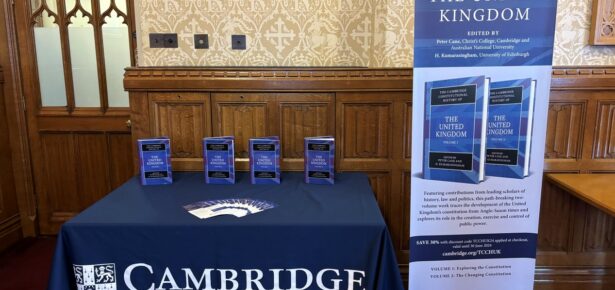
On 6 March 2024, The Cambridge Constitutional History of the United Kingdom was launched in the House of Lords. This is the first publication of its kind and the culmination of over 7 years of work, consisting of 2 volumes, 42 chapters, 40 authors and over 1000 pages. The multi-disciplinary intellectual contribution and expansive range on offer are what makes these volumes a distinctive and important resource to comprehend not just the United Kingdom’s constitution, but also crucial wider elements of British history, law, and political thought.
In planning this constitutional history our aim was to bring together the disciplines of history, law, and politics and show their impact on the constitution and vice-versa. Ours is not a reference text or handbook, but instead a narrative covering not just the chronological dimension, but also the themes, contestations, and institutions critical to appreciate the constitution’s influence and its centrality to the United Kingdom’s history. We actively sought, unlike previous accounts, to bring in the perspectives of Ireland, Scotland, Wales, and the British Empire in addition to England’s in order to see the wider and distinctive histories involved in the constitution. Collectively we have made an original and innovative publication that serves to remind scholars, students, and practitioners of the importance of Constitutional History to understand power, government, and society throughout the ages.
We are honoured that the President of the Supreme Court of the United Kingdom, Lord Reed of Allermuir, launched The Constitutional History of the United Kingdom and recognised our objectives and the value the volumes afford as can be seen below in his astute and generous words from 6 March.
It is a great pleasure to say a few words about the publication of this excellent book. Peter Cane and Harshan Kumarasingham have gathered together an outstanding group of authors, and they have produced a work of the highest quality. I would draw attention particularly to four features of the book.
First, it is a constitutional history of the United Kingdom. Earlier histories were mostly concerned with the constitutional history of England. The only work I have on my shelves was published more than 60 years ago, and limited itself to the period since the Tudors. But the present work is genuinely a constitutional history of the entire United Kingdom and its constituent parts. That is very welcome, as it does not make sense to consider the constitution of the UK today without regard to both the distinctiveness of Scotland, Northern Ireland and Wales, as well as England, and the role of the unions between them in our constitutional structure.
Secondly, the book takes a much fuller account than earlier histories of the role of empire and colonisation in the development of our constitution. That is an integral part of our history, and essential to understanding our constitution today.
Thirdly, unlike previous constitutional histories, which have mostly been written by historians, this work is jointly authored by historians, lawyers and political scientists. This is of enormous value in making sense of our constitution, as it is based not only on legal documents, or on political understandings and practices, but on a combination of law, politics and practice which encompasses more than one academic discipline.
Fourthly, the book makes plain two related aspects of the working of our constitution: first, that it involves the collaboration of the government, Parliament and the courts, playing distinct but complementary roles; and secondly, that it depends on understandings, generally tacit, about how power should be exercised. Because we have no written constitution, and court cases raising constitutional questions have until recently been few and far between, there has been relatively little by way of legal definition of constitutional principles. Vagueness and uncertainty have been useful in incentivising restraint in pushing at constitutional boundaries, as it hasn’t been clear where the boundaries lie. This kind of forbearance helps to avoid constitutional tensions, but it often goes unnoticed until it comes under strain. As our history demonstrates, there is a risk that a departure from conventional restraint on the part of one institution may result in a corresponding departure from conventional restraint on the part of another, so that we end up with different branches of the state testing the limits of their authority over each other. One of the lessons of the book is that constitutional stability depends on the government, Parliament and the courts working together in a spirit of comity, civility and mutual respect.
Today’s launch is the culmination of a very large project involving 40 distinguished contributors and an enormous amount of work by editorial and other staff at Cambridge University Press. The book is a great achievement, and I congratulate the editors and authors, and Cambridge University Press.
Latest Comments
Have your say!